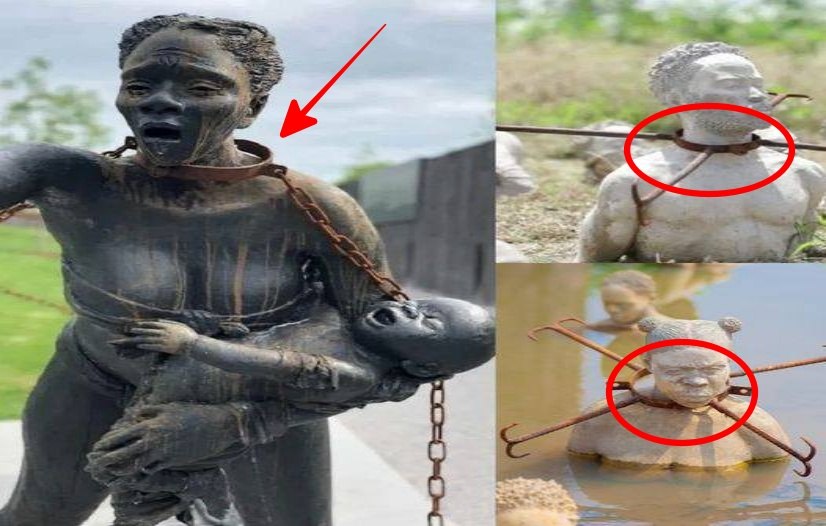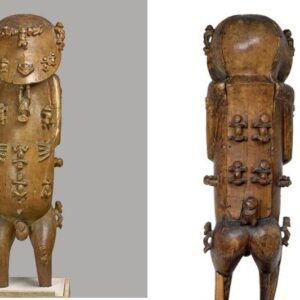In the annals of human history, there are stories that evoke shock and disbelief, tales that reveal the depths of cruelty and injustice that humanity is capable of inflicting upon its own. Among these narratives, one stands out as particularly harrowing—the ancient practice of chaining and burying women alive underground as punishment, a gruesome fate inflicted upon them by a forgotten empire nearly 100,000 years ago.
To comprehend the horror of this punishment, one must delve into the societal structures and beliefs of the era. In the distant past, gender roles were sharply defined, with women relegated to subordinate positions, their autonomy and agency severely restricted by patriarchal norms. Any deviation from these prescribed roles was met with swift and merciless retribution, as the ancient empire sought to maintain control over its female populace through fear and intimidation.

The exact circumstances that led to a woman’s condemnation to such a fate are lost to time, but the implications are clear: disobedience, defiance, or any perceived deviation from societal expectations were met with the harshest of punishments. To be chained around the neck and cast into the depths of the earth, left to suffocate beneath tons of soil and rock, was a fate reserved exclusively for women—a stark reminder of their status as second-class citizens in a society ruled by men.
The archaeological evidence of this practice is sparse but chilling. Burial sites discovered in remote regions yield skeletal remains bearing the unmistakable signs of trauma and confinement, providing grim testimony to the suffering endured by these ancient women. Their bones, once flesh and blood, now serve as silent witnesses to the horrors of a bygone era, their stories waiting to be told to a world that has long forgotten their existence.
Yet, even in the face of such brutality, there is evidence of resistance and resilience. The stories of women who defied societal expectations, who dared to challenge the status quo, are obscured by the passage of time but not entirely erased. They linger in the collective memory of humanity, a testament to the indomitable spirit that refuses to be silenced, even in the darkest of times.
As we grapple with the legacy of the ancient empire’s harsh penalty for women—chained and buried alive underground 100,000 years ago—we are confronted with uncomfortable truths about the nature of power, privilege, and oppression. The echoes of the past reverberate through the corridors of history, reminding us that the struggle for gender equality is far from over, that the fight for justice is an ongoing battle that requires vigilance and determination.
In confronting this grim reality, we are compelled to reflect on our own society and the injustices that persist within it. The chains may be gone, the burial chambers empty, but the specter of oppression still looms large, casting a shadow over the lives of countless women around the world. Only by acknowledging the sins of the past can we hope to build a more just and equitable future for all.
News
The stunning Temple of Garni, Armenia. Built nearly 2,000 years ago.
Nestled amidst the rugged terrain of Armenia stands a testament to ancient splendor: the stunning Temple of Garni. Built nearly 2,000 years ago, this architectural marvel is…
Reviving the Ancient Abu Simbel Temples: Restoration Efforts in Aswan, Egypt, 1968
In 1968, an extraordinary feat of human endeavor unfolded on the banks of the Nile River in Aswan, Egypt. The ancient Abu Simbel temples, standing for over…
Rare and Ancient Sculpture of Lord Ganesha Carved into the Rocks at Raghunandan Hills (Unakoti)
Nestled amidst the rugged terrain of Raghunandan Hills lies a treasure trove of history and spirituality — the rare and ancient sculpture of Lord Ganesha, immortalized in…
African Architecture: The Unique Construction of Djenné’s Great Mosque
In the heart of Mali lies a testament to human ingenuity and cultural heritage: The Great Mosque of Djenné. Built with indigenous materials, primarily mud brick and…
Bronze Spartan Shield from the Battle of Sphacteria 425 BC Displayed at Athenian Agora Museum
Among the many treasures housed at the Athenian Agora Museum, one artifact stands out for its historical significance and the stories it holds: a bronze Spartan shield,…
Enigmatic Pacific Deity: Captivating Polynesian Artistry
In the heart of Polynesia, amidst the whispers of the Pacific winds and the rhythm of ancient chants, lies a testament to the spiritual and artistic richness…
End of content
No more pages to load











